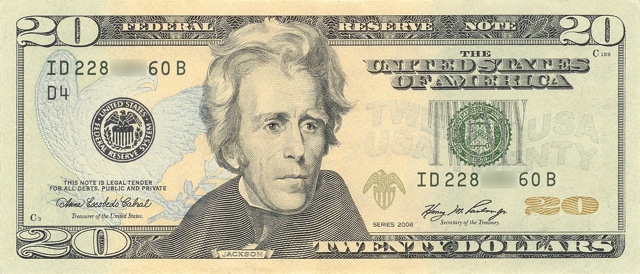Is There an Alternative to Taking Alexander Hamilton and Andrew Jackson Off Our Money?

Should Alexander Hamilton be removed from the ten dollar bill because he favored a presidency for life, made a 95 page public confession of his infidelity with sultry temptress Maria Reynolds, and considered democracy a disease of the political mind? Should Andrew Jackson be removed from the twenty dollar bill because he owned slaves and was cruel to the Creek and Cherokee Indians? Judging an historical figure by the moral standards of our own time is an historical fallacy known as presentism. Rather than becoming entangled in such arguments, I suggest we consider why we put these men on our currency in the first place.
What sort of country would we have become, if Thomas Jefferson and his followers had their way, and we rejected Hamilton’s Bank of the United States, the forerunner of the Federal Reserve System, scorned stock markets and factories and remained a nation of farmers? There is little doubt that America would have become the prey of industrial superpowers such as Great Britain, who would have manipulated the price of commodities and kept the former colonies in a perpetual state of debt. Without the resources to create a strong army and navy, America would have remained a weak subservient state, incapable of preventing Great Britain and European countries such as Napoleonic France or Bismarck’s Germany from invading North America whenever it was in their interest to do so.
What and where would we be if General Andrew Jackson had lost the Battle of New Orleans in 1815? At the time, no civilian in Louisiana thought this backwoods populist had a prayer of defeating an army of British veterans who had recently flattened Napoleon. They sent delegations begging him to surrender. If Jackson had been typical of the weak-kneed generals who led most of our armies in the War of 1812, we would not be the continent-straddling world power we are today. At best we would be a sliver of struggling states along the eastern seaboard, humbly eager to please Imperial Britain. The rest of the continent would be British and Spanish.
Jackson saw that the nation that controlled New Orleans had the power to strangle or encourage the economies of every western state. The old saying, money talks, would have had a British accent and so would most of the people living along the various rivers that carried their goods and farm products to New Orleans for export.
Some people have tried to deflate Jackson’s victory by pointing out that the British had already signed a treaty of peace in distant London when the battle was fought. Can anyone who knows how often the British ignored treaties when they clashed with their national self-interest take this seriously? When the news that New Orleans was theirs reached London, that peace treaty would have instantly become waste paper.
There is no doubt that the previous paragraphs will ignite arguments among people who have allowed presentism to muddle their perceptions of our past. Today, almost every woman is a feminist to some degree. Although there are still patches of inequality in some areas, such as wages, few people of either sex see any reason why a woman should not be on our currency. But do they also insist that Hamilton and Jackson should be removed? I don’t think so.
This leaves us room to do something original. Keep Alexander Hamilton on the ten and Andrew Jackson on the twenty dollar bills and produce a separate line of tens and twenties, featuring two famous women. Eleanor Roosevelt is my candidate for the ten and Harriet Tubman, founder of the Underground Railroad that helped thousands escape slavery, is my favorite for the twenty.
If anyone among us – male or female -- prefers to fill his or her wallets exclusively with Roosevelts and Tubmans, so what? They can even refuse to accept Hamiltons or Jacksons at their banks or supermarkets. They will have a perfect right to do so – and the United States can devote its time to being a country with some very big worries that need serious attention.